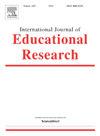The impact of classroom environment on students' willingness to communicate in foreign language learning
IF 2.5
3区 教育学
Q1 EDUCATION & EDUCATIONAL RESEARCH
引用次数: 0
Abstract
The primary goal of teaching a foreign language has undergone a substantial change in the context of modern language education, placing a greater emphasis on the pivotal role of efficient communication. In this evolving landscape of language education, where effective communication is the cornerstone, it has been of the utmost significance to investigate the factors that affect learners’ motivation to communicate. Hence, the concept of Willingness to Communicate (WTC) has emerged as a focal point for both scholars and researchers in the field. While scholars have devoted considerable attention to WTC, the existing body of literature remains predominantly focused on studies conducted in Western nations. Addressing this research gap, the current study explores WTC in the Turkish EFL setting through a rigorous mixed-methods research design with a varied cohort of 207 participants. This study aims to provide further understanding of this vital facet of language learning by a careful examination of the intricate relation between WTC and the learning environment in the classroom. The findings indicate a noteworthy impact of classroom components on the WTC among Turkish EFL students, revealing a robust connection between these factors and affective aspects as well. This correlation underscores the study's valuable insights for guiding language policies and strategies aimed at enhancing English proficiency within Turkey.
外语学习中课堂环境对学生交流意愿的影响
在现代语言教育的背景下,外语教学的主要目标发生了实质性的变化,更加强调有效交流的关键作用。在语言教育不断发展的背景下,有效的交际是语言教育的基石,因此研究影响学习者交际动机的因素就显得尤为重要。因此,沟通意愿(WTC)的概念已成为该领域学者和研究人员关注的焦点。虽然学者们对WTC投入了相当多的关注,但现有的文献仍然主要集中在西方国家进行的研究。为了解决这一研究缺口,本研究通过严格的混合方法研究设计,对207名参与者进行了不同的队列研究,探讨了土耳其英语背景下的WTC。本研究旨在通过对课堂学习环境与语感之间复杂关系的仔细研究,进一步了解语言学习的这一重要方面。研究结果表明,课堂因素对土耳其英语学生的语言表达有显著影响,揭示了这些因素与情感方面之间的密切联系。这种相关性强调了该研究对指导旨在提高土耳其英语水平的语言政策和战略的有价值的见解。
本文章由计算机程序翻译,如有差异,请以英文原文为准。
求助全文
约1分钟内获得全文
求助全文
来源期刊

International Journal of Educational Research
EDUCATION & EDUCATIONAL RESEARCH-
CiteScore
6.20
自引率
3.10%
发文量
141
审稿时长
21 days
期刊介绍:
The International Journal of Educational Research publishes regular papers and special issues on specific topics of interest to international audiences of educational researchers. Examples of recent Special Issues published in the journal illustrate the breadth of topics that have be included in the journal: Students Perspectives on Learning Environments, Social, Motivational and Emotional Aspects of Learning Disabilities, Epistemological Beliefs and Domain, Analyzing Mathematics Classroom Cultures and Practices, and Music Education: A site for collaborative creativity.
 求助内容:
求助内容: 应助结果提醒方式:
应助结果提醒方式:


